Working...

 What I'm Reading
What I'm Reading
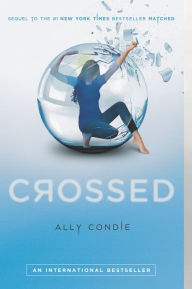
Chasing down an uncertain future, Cassia makes her way to the Outer Provinces in pursuit of Ky--taken by Society to his certain death--only to find that he has escaped into the majestic, but treacherous, canyons. On this wild frontier are glimmers of a different life . . . and the enthralling promise of rebellion. But even as Cassia sacrifices everything to reunite with Ky, ingenious surprises from Xander may change the game. On the edge of Society, nothing is as expected, and crosses and double crosses make Cassia's path more twisted than ever.
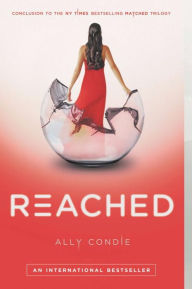
Cassia’s journey began with an error, a momentary glitch in the otherwise perfect façade of the Society. After crossing canyons to break free, she waits, silk and paper smuggled against her skin, ready for the final chapter.
The wait is over.
One young woman has raged against those who threaten to keep away what matters most—family, love, choice. Her quiet revolution is about to explode into full-scale rebellion. With exquisite prose, the emotionally gripping conclusion to the international–bestselling Matched trilogy returns Cassia, Ky, and Xander to the Society to save the one thing they have been denied for so long, the power to choose.
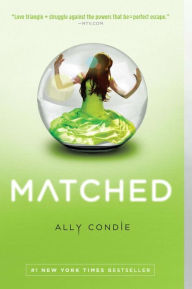
Cassia has always trusted the Society to make the right choices for her: what to read, what to watch, what to believe. So when Xander's face appears on-screen at her Matching ceremony, Cassia knows he is her ideal mate . . . until she sees Ky Markham's face flash for an instant before the screen fades to black. The Society tells her it's a glitch, a rare malfunction, and that she should focus on the happy life she's destined to lead with Xander. But Cassia can't stop thinking about Ky, and as they slowly fall in love, Cassia begins to doubt the Society's infallibility and is faced with an impossible choice: between Xander and Ky, between the only life she's known and a path that no one else has dared to follow.
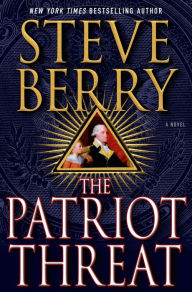
Cotton Malone, once a member of an elite intelligence division within the Justice Department known as the Magellan Billet, is now retired and owns an old bookshop in Denmark. But when his former-boss, Stephanie Nelle, asks him to track a rogue North Korean who may have acquired some top secret Treasury Department files--the kind that could bring the United States to its knees--Malone is vaulted into a harrowing twenty-four hour chase that begins on the canals in Venice and ends in the remote highlands of Croatia.
With appearances by Franklin Roosevelt, Andrew Mellon, a curious painting that still hangs in the National Gallery of Art, and some eye-opening revelations from the $1 bill, this riveting, non-stop adventure is trademark Steve Berry--90% historical fact, 10% exciting speculation--a provocative thriller posing a dangerous question: What if the Federal income tax is illegal?
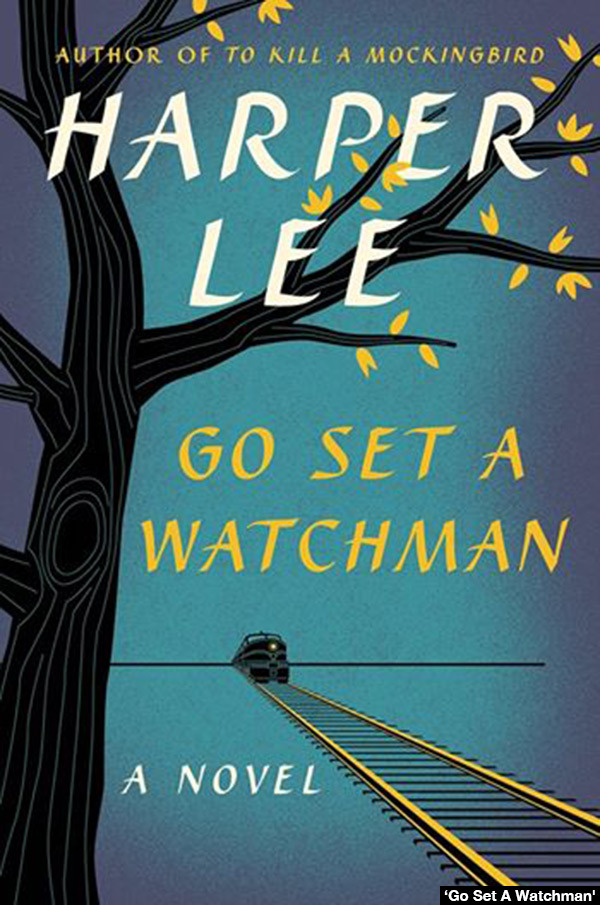
The book opens in the 1950s with Jean Louise, a grown-up 26-year-old Scout, returning to Maycomb from New York, where she's been living as an independent woman. Jean Louise is there to see Atticus, now in his seventies and debilitated by arthritis. She arrives in a town bristling from the NAACP's actions to desegregate the schools. Her aunt Zandra, the classic Southern gentlewoman, berates Jean Louise for wearing slacks and for considering her longtime friend and Atticus protégé Henry Clinton as a potential husband—Zandra dubs him trash. But the crux of the book is that Atticus and Henry are racist, as is everyone else in Jean Louise's old life (even her childhood caretaker, Calpurnia, sees the white folks as the enemy). The presentation of the South pushing back against the dictates of the Federal government, utilizing characters from a book that was about justice prevailing in the South through the efforts of an unambiguous hero, is a worthy endeavor.

Eli and his family lived in an underground shelter they called the Compound for six years. They thought they were the only survivors of a nuclear attack, but when Eli learned that it was all a twisted experiment orchestrated by his tech-visionary father, he broke the family out. His father died trying to keep them imprisoned.
Now, the family must readjust to life in the real world. Their ordeal has made them so famous, they must stay in hiding—everyone from fatalists preparing for doomsday to the tabloid media wants a piece of them. Even worse, their father’s former adviser continues to control the company Eli and his twin brother are the heirs of.
As Eli tries to determine who the family can trust, he learns the nightmare of the Compound—and his father’s experiment—might not be over. The Fallout is S.A. Bodeen's highly anticipated, thrilling sequel that will keep readers on the edge of their seats.

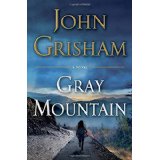
The year is 2008 and Samantha Kofer’s career at a huge Wall Street law firm is on the fast track—until the recession hits and she gets downsized, furloughed, escorted out of the building. Samantha, though, is one of the “lucky” associates. She’s offered an opportunity to work at a legal aid clinic for one year without pay, after which there would be a slim chance that she’d get her old job back.
In a matter of days Samantha moves from Manhattan to Brady, Virginia, population 2,200, in the heart of Appalachia, a part of the world she has only read about. Mattie Wyatt, lifelong Brady resident and head of the town’s legal aid clinic, is there to teach her how to “help real people with real problems.” For the first time in her career, Samantha prepares a lawsuit, sees the inside of an actual courtroom, gets scolded by a judge, and receives threats from locals who aren’t so thrilled to have a big-city lawyer in town. And she learns that Brady, like most small towns, harbors some big secrets.
Her new job takes Samantha into the murky and dangerous world of coal mining, where laws are often broken, rules are ignored, regulations are flouted, communities are divided, and the land itself is under attack from Big Coal. Violence is always just around the corner, and within weeks Samantha finds herself engulfed in litigation that turns deadly.
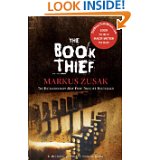
Set during World War II in Germany, Markus Zusak’s groundbreaking novel is the story of Liesel Meminger, a foster girl living outside of Munich. Liesel scratches out a meager existence for herself by stealing when she encounters something she can’t resist–books. With the help of her accordion-playing foster father, she learns to read and shares her stolen books with her neighbors during bombing raids as well as with the Jewish man hidden in her basement before he is marched to Dachau.
The country is holding its breath. Death has never been busier, and will become busier still.
This book has been selected as a Common Core State Standards Text Exemplar (Grades 9-10, Stories) in Appendix B.
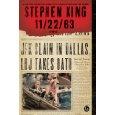
On November 22, 1963, three shots rang out in Dallas, President Kennedy died, and the world changed. What if you could change it back? Stephen King’s heart-stoppingly dramatic new novel is about a man who travels back in time to prevent the JFK assassination—a thousand page tour de force. Jake Epping is a thirty-five-year-old high school English teacher in Lisbon Falls, Maine, who makes extra money teaching adults in the GED program. He receives an essay from one of the students—a gruesome, harrowing first person story about the night 50 years ago when Harry Dunning’s father came home and killed his mother, his sister, and his brother with a hammer. Harry escaped with a smashed leg, as evidenced by his crooked walk. Not much later, Jake’s friend Al, who runs the local diner, divulges a secret: his storeroom is a portal to 1958. He enlists Jake on an insane—and insanely possible—mission to try to prevent the Kennedy assassination. So begins Jake’s new life as George Amberson and his new world of Elvis and JFK, of big American cars and sock hops, of a troubled loner named Lee Harvey Oswald and a beautiful high school librarian named Sadie Dunhill, who becomes the love of Jake’s life – a life that transgresses all the normal rules of time.

Christian author and motivational speaker Andrews effectively combines self-help with fiction to catch readers' interest, sustaining momentum while simultaneously passing on instructions for positive thinking. With his can-do style, Andrews (Storms of Perfection; Tales from Sawyerton Springs) tells the allegorical tragedy of one David Ponder, whose woes begin when he loses his job, his confidence and essentially his drive for living. After a succession of losses, Ponder is rendered unconscious after a car accident, and is magically transported into seven key points in history. At each stopping point, he is met by historical figures such as Abraham Lincoln, Anne Frank, King Solomon, Harry Truman and Christopher Columbus, each of whom imparts one of the seven key decisions that Andrews asserts are essential for personal success. After his travel through time, Ponder regains consciousness in a hospital and discovers he is holding letters given to him by the various heroes. The letters offer familiar self-help counsel: accept that the buck stops with you, become a wisdom seeker and a person of action, determine to be happy, open the day with a forgiving spirit, and persist despite all odds. Although Andrews writes from a Christian perspective, his overall message (trust that God is sovereign, but do your part in making your future happen) will ring true with a broad spectrum of inspirational readers. Some astute thinkers may be put off by the simplistic story line, but Andrews does an exemplary job at providing positive suggestions for overcoming life's obstacles.
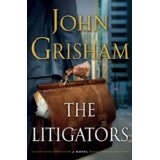
The partners at Finley & Figg—all two of them—often refer to themselves as “a boutique law firm.” Boutique, as in chic, selective, and prosperous. They are, of course, none of these things. What they are is a two-bit operation always in search of their big break, ambulance chasers who’ve been in the trenches much too long making way too little. Their specialties, so to speak, are quickie divorces and DUIs, with the occasional jackpot of an actual car wreck thrown in. After twenty plus years together, Oscar Finley and Wally Figg bicker like an old married couple but somehow continue to scratch out a half-decent living from their seedy bungalow offices in southwest Chicago. And then change comes their way. More accurately, it stumbles in. David Zinc, a young but already burned-out attorney, walks away from his fast-track career at a fancy downtown firm, goes on a serious bender, and finds himself literally at the doorstep of our boutique firm. Once David sobers up and comes to grips with the fact that he’s suddenly unemployed, any job—even one with Finley & Figg—looks okay to him. With their new associate on board, F&F is ready to tackle a really big case, a case that could make the partners rich without requiring them to actually practice much law. An extremely popular drug, Krayoxx, the number one cholesterol reducer for the dangerously overweight, produced by Varrick Labs, a giant pharmaceutical company with annual sales of $25 billion, has recently come under fire after several patients taking it have suffered heart attacks. Wally smells money. A little online research confirms Wally’s suspicions—a huge plaintiffs’ firm in Florida is putting together a class action suit against Varrick. All Finley & Figg has to do is find a handful of people who have had heart attacks while taking Krayoxx, convince them to become clients, join the class action, and ride along to fame and fortune. With any luck, they won’t even have to enter a courtroom! It almost seems too good to be true. And it is.
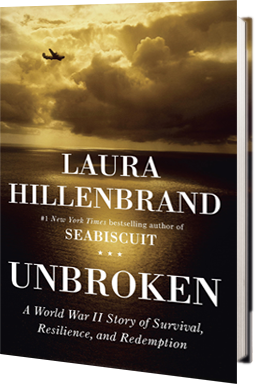
On a May afternoon in 1943, an Army Air Forces bomber crashed into the Pacific Ocean and disappeared, leaving only a spray of debris and a slick of oil, gasoline, and blood. Then, on the ocean surface, a face appeared. It was that of a young lieutenant, the plane’s bombardier, who was struggling to a life raft and pulling himself aboard. So began one of the most extraordinary odysseys of the Second World War.
The lieutenant’s name was Louis Zamperini. In boyhood, he’d been a cunning and incorrigible delinquent, breaking into houses, brawling, and fleeing his home to ride the rails. As a teenager, he had channeled his defiance into running, discovering a prodigious talent that had carried him to the Berlin Olympics and within sight of the four-minute mile. But when war had come, the athlete had become an airman, embarking on a journey that led to his doomed flight, a tiny raft, and a drift into the unknown.
Ahead of Zamperini lay thousands of miles of open ocean, leaping sharks, a foundering raft, thirst and starvation, enemy aircraft, and, beyond, a trial even greater. Driven to the limits of endurance, Zamperini would answer desperation with ingenuity; suffering with hope, resolve, and humor; brutality with rebellion. His fate, whether triumph or tragedy, would be suspended on the fraying wire of his will.